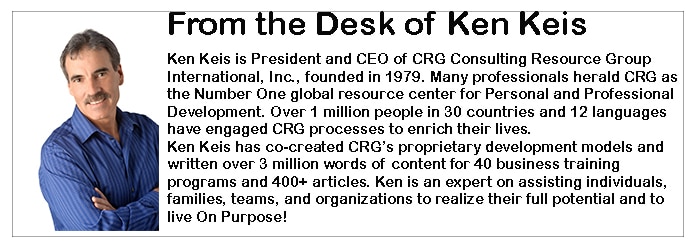Winners never quit!
Guest Post by Ken Keis of 
Winners Never Quit and Quitters Never Win!
Quitter: One who quits; especially, one who gives up too easily; a defeatist.
All of us at some time have wanted to quit on something or someone.
Just yesterday, I was running in a 5 K race. I wanted so much to just walk for a bit, especially in the last mile. All the way to the end, I had to fight the urge to quit. It turns out that I won in my age category by only 2 seconds! If had walked even three steps, I would have lost that race.
So, what are you? A winner or a quitter?
If you quit, your life can be about a lot of near–misses and few victories.
Quitting can apply to every part of our lives.
Here are a few examples.
Someone quits on a relationship because it is too much work to change. Over 50% of marriages end in divorce, so we have a lot of quitters.
You are difficult to work with and continue to change jobs, not because of poor companies but because you are a quitter.
You start your wellness program but, a few weeks or months into it, you stop eating properly and/or working out. Over 90% of individuals quit their diets. Many excuses are made, but the fact is they quit.
You submit your book proposal to a few agencies and publishers; they all reject your work so you quit trying.
You submit your résumé to 50 job openings but no one hires you. You think why bother and quit looking.
You get the picture.
Many of life’s best success stories are about individuals who never quit—especially when their peers gave up.
In the past, I did some speaking engagements for Mark Victor Hansen, co-author of the bestselling “Chicken Soup” series. Mark said that the first book written by himself and Jack Canfield was rejected by more than 25 publishers before their concept for Chicken Soup for the Soul was accepted.
Can you imagine being one of the publishers who said No?
Success was not immediate for Mark and Jack. After their book was published, they did a radio interview every day for over a year before Chicken Soup caught on with the reading public. In other words, they did not quit.
Stephen Covey’s The 7 Habits of Highly Effective People was available for several years before it made the bestseller list.
Abraham Lincoln faced many challenges, defeats, and failures before he became President of the United States in 1860—but he never quit.
Nelson Mandela spent 27 years incarcerated as a political prisoner before he was released and became the President of South Africa in 1994. Most of us would have quit long before 27 years.
I mentioned in my previous ezine that many times during the year it took to write my latest book, Why Aren’t You More Like Me?™ , I felt like quitting. Even though I felt like it, I did not.
I don’t know what you are facing but, in most cases, quitting is not the answer. Last week, I met with a colleague in Orlando, Florida. He shared that just 2 months prior to our meeting, he was unable to walk after a recent stroke. According to his doctor, the only reason he is currently walking, with the assistance of a cane, is his unwillingness to quit.
Quitting or not quitting is a choice and a reflection on the character of the individual. Rarely does it have to do with education, intelligence, or opportunity, but rather your level of persistence, tenacity, determination, and commitment to a vision or goal.
Now even if you have quit on something or someone and feel guilty about it, you can always change your mind and get back on the track of success.
There are exceptions, where changing or quitting is a preferred direction. Choosing not to do something because it does not match your purpose, passions, or values is something different than quitting on a goal or a dream or simply giving up on something you desire.
All of us face challenges. It is our response to our challenges that separates the winners from the quitters.
Review the Action Steps to strengthen your resolve to triumph and achieve.
Action Steps
Winners Never Quit and Quitters Never Win!
- Would you call yourself a winner or a quitter? Why?
- In what area(s) of your life would you like to stop quitting and start winning? We all have some area we would like to improve.
- Think about an area in your life where you just never quit. Why and how are you able to persevere?
- What do you do to stay focused and move forward when you feel like quitting?
- In what area of your life did you quit and regret it? Why did you quit? Do you still want to achieve that goal?
- Winners have no fewer challenges than quitters, but they make a decision to keep going. You can make the decision right now in one area of your life, you will not quit . . . no matter what!
- Success breeds success and failure feeds failure. If you have been quitting, focus on one area where you will stay on course and not quit. Use your success and fulfillment from that area to leverage other areas of your life.
- Not quitting comes from a deep desire to achieve and a strong connection to your goal or dream. Go back to What’s Your Vision and lock in your vision of what it takes to become a winner.
Clarify your values and style using CRG’s Values Preference Indicator and Personal Style Indicator. They can help you make values-based decisions as you develop yourself and play to your strengths. To help you engage life on your terms, read Why Aren’t You More Like Me?
Let go of any past failure. Learn from it and move on. Holding on to the past will not help you shape a bright future.
Encourage and help others to keep going when they want to quit. Your words to them will help you in your times of doubt.
Enjoy the journey along the way. It is the fullness of our experiences—not simply the achievement of a goal—that makes us who we are. Here’s to us all being Winners, not quitters.
- To clarify your values and style, complete the CRG’s Values Preference Indicator (VPI) and
- the Personal Style Indicator (PSI) to get to know yourself better so you are less influenced by others.
- To understand how your level of self-worth is affecting your success, complete theSelf-Worth Inventory.
- To help you understand your tendencies and what is important to you, read Why Aren’t You More Like Me?“!
Your life or business is your own to live.
Until next time, keep Living On Purpose.

Ken Keis
For information on CRG Resources, please visit http://www.crgleader.com/home.
Interested in Ken Keis speaking at your event?











